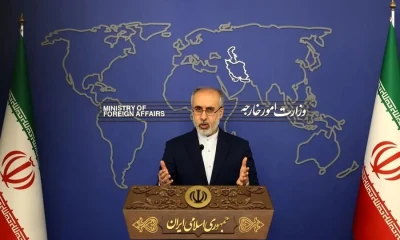Edited by Deepali Verma
Upon White House declining to disclose if strikes on Tehran were ruled out during escalating tensions, Iran declared on February 6 that it “will not hesitate” to respond if the United States launched an attack on its soil.
“The Islamic Republic has always showcased that it had reacted decisively to any threat to its security, territorial integrity and sovereignty,” remarked Iran’s Foreign Ministry Spokesman Nasser Kanani during his weekly press briefing, AFP reported.
“Iran will not hold back in using its capabilities to react to any attacks on its territory, ” he asserted, further adding that Tehran “has no intention to aggravate tensions and crises in the region”.
Recently, Hossein Amir-Abdollahian, the foreign minister of Iran, had condemned the recent acts of aggression against West Asian states and issued warning to the United States and the UK against testing the wrath of these countries.
Amir-Abdollahian wrote in a post on his X that Iran denounces the most recent round of airstrikes on Yemen carried out by the US and Britain, and the fatal raids carried out by US occupying forces on numerous locations in Iraq and Syria.
“We strongly stand against the US and British military attacks on Yemen and the US aggression on Iraq and Syria.. You shouldn’t test the wrath of the region. We consider the security of Iraq, Syria, Yemen and Palestine (Gaza as well as the West Bank) to be the security of the region,” said the Iranian Foreign Minister.
The US has accused Iran of escalating the conflict in Gaza by releasing its proxies such as the Houthis, Hezbollah, and the Iraqi Resistance throughout the region.
National Security Advisor from White House Jake Sullivan recently said that the US would continue its retaliation against organisations in Syria and Iraq that continue to receive support from Iran.
In response to a question about whether the US would rule out going after Iran directly, Sullivan told NBC that “it is not wise for me to talk about what we’re ruling in and ruling out.”
Regional tensions have grown since the commencement of the Israel-Hamas war on October 7, prompting Iran-backed groups stationed in Iraq, Syria, Yemen and Lebanon to stand in solidarity with Palestinians.
To retaliate against the drone strike that killed three American servicemen in Jordan on January 28, the US military chose to launch an airstrike on dozens of targets in Iraq and Syria that were utilised by Iranian-backed militias as well as the Iranian Revolutionary Guard.
Over 85 targets were hit by the massive onslaught of strikes at seven different locations. The targets of which were intelligence and command centres, missile and rocket launchers, and drone and ammunition storage sites that had been associated with the militias or the IRGC’s Quds Force, the Guard’s expeditionary division that manages Tehran’s relations with and arming regional militias.
President Joe Biden, after the strikes, released a statement that the air strikes would continue “at times and places of our choosing.”
“The United States seeks no conflict in the Middle East or anywhere else in the world,” Biden said. “But who might seek to do us harm must know this: If you harm an American then we will respond.”
Responding, Iraq said that the US was the first to initiate the assaults against the sovereignty of the nation and has further accused the United States of “disavowing legal responsibility” as well as misleading international public opinion”.

















